Image Source: pxhere.comhttp://www.pxhere.com
It is normal for dogs and cats to scratch a bit, often out of boredom or habit. However, if your pet’s scratching is getting out of hand, it’s time to take a closer look.
If your pet is itchy and shows signs of redness on their stomach, chest, muzzle or between their toes, it may be due to:
- parasites (fleas, ticks, nymph ticks, mites etc..)
- infections (bacterial and yeast)
- food allergies
- environmental irritants or allergens
Symptoms of Allergies
Signs that your pet is struggling with these symptoms are usually noticed around the age of 1-3 years old. They might be seasonal or year-round and may result in one or a combination of:
- Constant licking, chewing, biting or scratching.
- Excessive rolling, rubbing or scooting.
- Foot chewing.
- Hair loss.
- Recurrent ear problems.
- Rashes or sores.
- Changes in skin colour.
- Unusual smell.
- Evidence of “hotspots”.
Areas Most Affected by Allergies
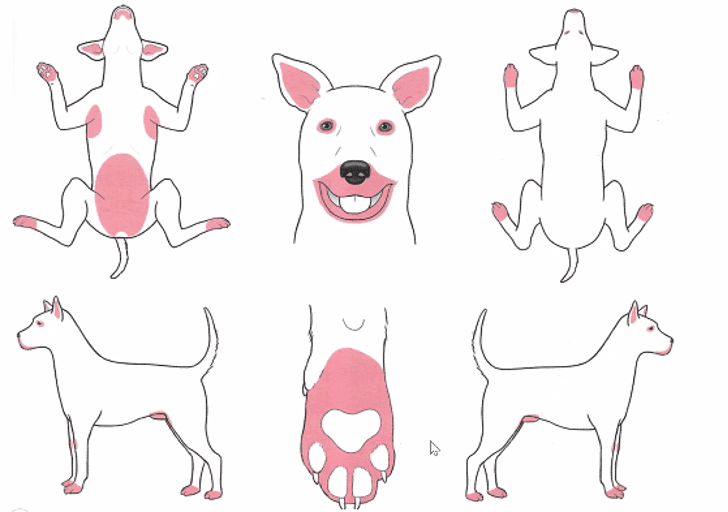
What is a Hotspot
Also known as acute moist dermatitis, hot spots are localised areas of skin inflammation and bacterial infection. Often a hot spot will begin as a small red area that owners may mistake for an insect bite. Unlike an insect bite, a hot spot will rapidly worsen and spread, developing into a hot, red, oozing, and painful lesion.
Types of Allergies:
1/ Food Allergy
If you think your pet is showing signs of a food toxicity, call us immediately!
- Pymble Clinic on 9499 4010
- Killara Hospital on 8350 5678
- Out of Hours call: NEVS 9452 2933
Please note, this is a food-allergy discussion and is separate to Toxic Dangers to Cats & Dogs. Also note that Lilies are Toxic to Cats.
Pets most commonly have allergic food reactions to proteins.
Food allergies can appear at any age, whether a pet has just started a new diet or has been eating the same food for several years.
Symptoms of food allergies:
- Skin diseases such as atopic dermatitis
- Otitis Externa (Ear Infection)
- Diarrhoea or other digestive problems.
A correct diagnosis of the source of allergy is critical to ensuring the right treatment for your pet. There is no quick blood test that accurately diagnoses food allergies. The best way to a eliminate food allergy is with a food trial with a novel protein. Discuss how to do this effectively and safely with us at The Village Vet. It may not be safe to do this in a young pet as their diet is critical in the first 12-14 months of life when they are rapidly growing.
2/ Flea Allergy Dermatitis (FAD)
Flea allergies were once a common cause of skin irritation to our pets. However, with the newer flea and tick treatments we have available to us, this is less often an issue nowadays. The saliva from a flea bite irritates the skin and causes the pet to inflame the area with constant licking and chewing to relieve the irritation. This can lead to greater irritation, potentially forming a hotspot or widespread miliary dermatitis.
- Check your pet regularly for fleas and flea dirt. Flea faeces look like black specks in your pet’s fur.
- The Village Vet highly recommends a year-round flea and tick prevention treatment for all your pets.
- Daily vacuuming and frequent washing of your pet’s bedding can also reduce your home’s flea population.
- Mosquitoes and flies can also be responsible for allergic or irritating skin reactions in our pets. Certain breeds and largely outdoor pets are more at risk.
3/ Atopic Dermatitis or Environmental Allergy
Atopy is an allergic reaction to an otherwise harmless airborne substances in the environment such as pollen, mould, house dust mites and animal danger (skin or hair fragments).
As with humans, the skin is our pet’s largest organ so is a critical defence against irritants to their internal system.
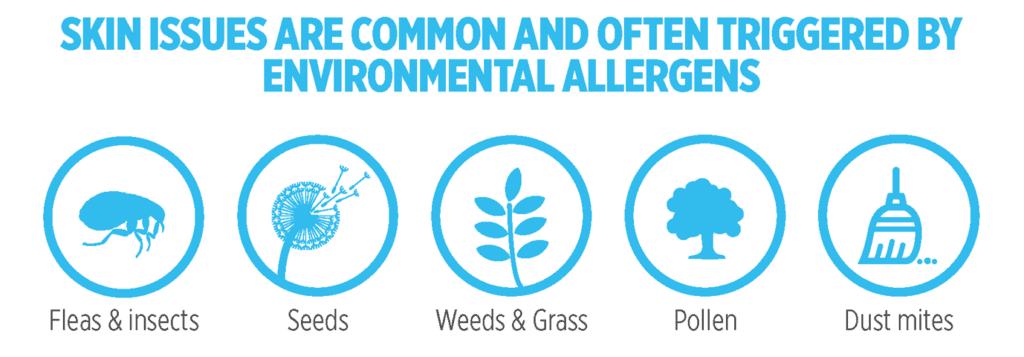
4/ Asthma
Pets can also suffer from asthma. While this can be chronic and is not curable, it can be very well managed with assistance from The Village Vet. We actually use puffers in our pets!
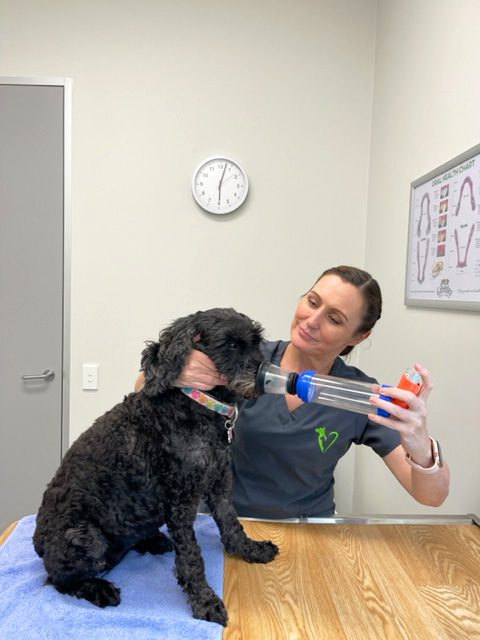
If you think your pet may be suffering from any of these issues, give us a call at the Pymble Clinic on 9499 4010 or Killara Hospital on 8350 5678. Our staff are well trained to identify the correct signs and make a quick diagnosis.
5/ Contact Allergy
Grasses, plants and pollens can be either inhaled by your pet or come into direct contact with their skin. Most commonly affected are the areas along the underside of your pet with less hair – groin, stomach, armpits – as well as their face and ears. When this happens, the itchy symptoms cause the pet to lick and chew the area to relieve the irritation.
Plants Your Pet Should Stay Away From:
- Zebrina (Tradescantia zebrina)
- Trad or Wandering Jew (Tradescantia albiflora)
- Tutle Vine (Callisia repens)
- Moses-in-a-cradle (Tradescantia spathacea)
- Purple Heart (Tradescantia pallida)
- Itch Plant (Allisia fragrans)
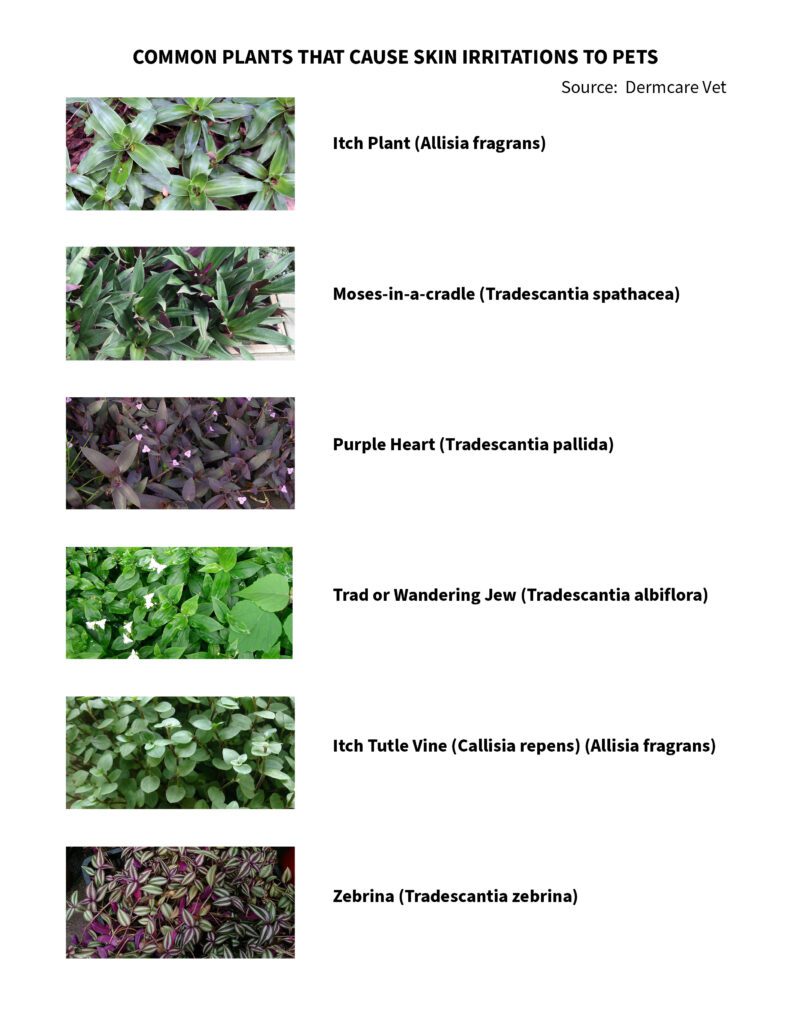
7/ Breed Types
Susceptibility to these substances will depend on your pet’s genetic heritage and exposure. Breeds that are particularly prone to atopy are Terriers, Setters, Retrievers, Dalmatians and Chinese Shar-Pei.
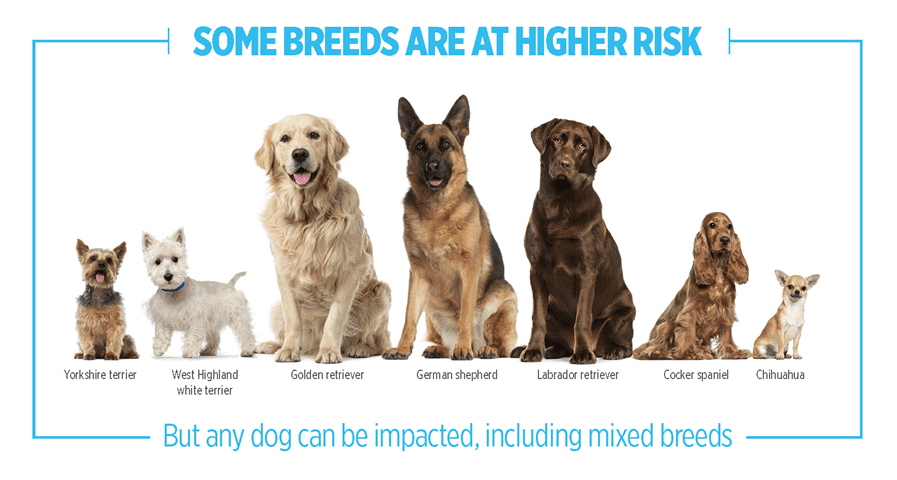
Treatments
Correct Diagnosis.
There are a number of ways The Village Vet will be able to help your pet with allergy symptoms. Treatment often involves a combination of strategies: anti-itch therapy to break the “itch-scratch” cycle that leads to secondary infections, removing the source of the allergy, careful monitoring of diet, exposure and symptoms, and customised treatment plans that your vet will prescribe once your pet has been assessed.
Non-Steroid Treatments Now Available
Apoquel & Cytopoint are both non-steroidal, fast acting relief medications for skin irritations. These products provide the best treatment outcome without the side effects of steroids. Speak to us at The Village Vet, Pymble Clinic on 9499 4010 or Killara Hospital on 8350 5678 to find out more about these leading-technology products.
Grooming
Washing your pet with medicated shampoo and conditioner such as PAWs Mediderm will help control superficial yeast and bacterial infections. Speak to The Village Vet team about correct use of these products to maximise their effectiveness.
Wiping down your pet’s skin with a damp cloth after a walk in long grasses, will also help remove allergens from their skin/ feet and can help prevent itching and scratching.
Omega 3 Fatty Acids
Adding fish oil to your pet’s diet or starting on a prescription diet such as Hill’s Derm Complete can stabilise the skin junctions and help nourish your pet’s skin from within. Talk to our staff for information on both these dietary options.
Ceramide Conditioners
The PAWs Nutriderm Conditioner can be used as a regular leave in product to help replenish the skin barrier with critical ceramides.
Maintain Your Environment
- Owners can identify and remove problem plants from gardens and monitor their pets for any early signs of irritation.
- Removing potential flea, tick, mosquito breeding sources from your environment can also help.
- Screen doors and windows and have your pet sleep inside.
Use An Itch-Tracker
If you are still unsure that your pet’s scratching is a problem or simply a boredom buster, use this Itch-Tracker chart to monitor your pet’s flare-ups. If you notice an increase in your dog’s itch score, make an appointment to see us at The Village Vet.
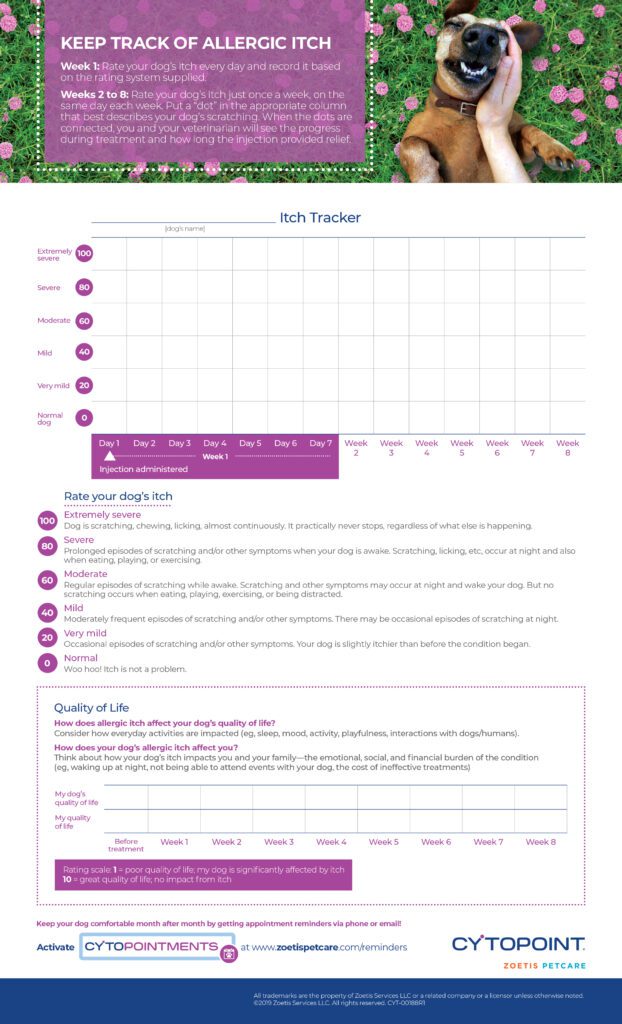
Summary
Skin irritations are common amongst our pets. They can often be treated easily and non-invasively. Prevention is better than a cure and identifying early signs of skin irritations will prevent infections from forming.
Grooming your pet is not only a bonding opportunity but a time to check their bodies, teeth, eyes and ears for anything unusual. Give The Village Vet a call any time if you are unsure of something on your pet’s body.
Book online at The Village Vet or call us directly at the Pymble Clinic on 9499 4010 or Killara Hospital on 8350 5678
Sources:
- Dr Martine Perkins:The Village Vet (Pymble Vet Clinic and Killara Vet Hospital)
- MSD Animal Health: Information PDF Allergies.
- Vetschoice.com.au: Dr Alice Marshall, Registered Veterinarian (NSW VSB)
- Zoetis: Apoquel & Cytopoint Product Information
- PAW by Blackmores: Product Information
- Dermcare: Product Leaflet


